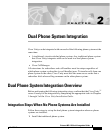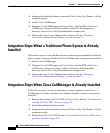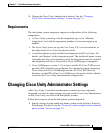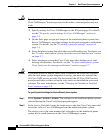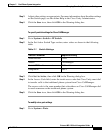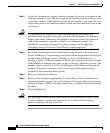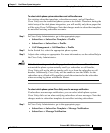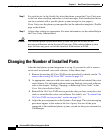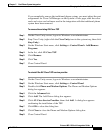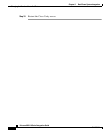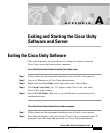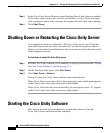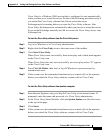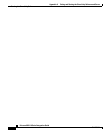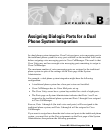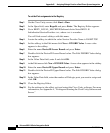
A-3
Ericsson MD-110 Serial Integration Guide
OL-1290-01
Appendix A Exiting and Starting the Cisco Unity Software and Server
Starting the Cisco Unity Software
Cisco Unity is a Windows 2000 service that is configured to start automatically
when you turn on or restart the server. Do one of the following procedures only if
you exited the Cisco Unity software but did not restart the server.
Exchange must be running before you start the Cisco Unity software. Like
Cisco Unity, Exchange starts automatically when you turn on or restart the server.
If you exited Exchange manually but did not restart the Cisco Unity server, start
Exchange first.
To start the Cisco Unity software from the Cisco Unity server
Step 1 Log on to Windows as a Cisco Unity administrator.
Step 2 Right-click the Cisco Unity icon in the status area of the taskbar.
Step 3 Click Start Cisco Unity.
When Cisco Unity starts successfully, three tones play and a check mark appears
in the Cisco Unity icon.
When Cisco Unity does not start successfully, two tones play and an “X” appears
in the Cisco Unity icon.
Step 4 Press Ctrl-Alt-Delete, then lock or log off Windows to prevent access by
unauthorized users.
Step 5 If the system uses the automated attendant and you routed calls to the operator
before you exited the Cisco Unity software, reroute calls to Cisco Unity.
To start the Cisco Unity software from another computer
Step 1 Start Internet Explorer, and go to http://<Cisco Unity server name>/status. If
prompted, enter the name and password of a Cisco Unity administrator.
Step 2 In the Cisco Unity Status Monitor, click the System Status icon (the first icon),
at the top of the page.
Step 3 Click Start.
Step 4 If the system uses the automated attendant and you routed calls to the operator
before you exited the Cisco Unity software, reroute calls to Cisco Unity.



